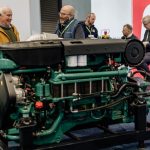If wild salmon are going to survive, the open net cage farms must get out of the water. Couple of years ago government and industry were claiming that growing salmon in tanks was impossible and would never happen. Most of the companies are also rady for the enormous shift. Overwaitea Food Group has committed to switching to selling farmed salmon only if it is grown in closed containment.
The key to closed system aquaculture is control of the interactions between the wild and the farmed fish. Systems that allow control of water intake, water and waste outputs, and separation from surroundings, will reduce and actually eliminate a number of current problems such as disease, sea lice, fish waste, algal blooms, storms, invasive species, the minimal use of antibiotics or pesticides.
The one major problem of farming salmon which closed containment does not address is that of feed. As salmon eat other fish, currently the feed is being made from whole fish caught for this purpose, consuming more fish by weight than is produced. This must be addressed if salmon farming in closed containment is to be truly sustainable.
Closed system salmon aquaculture has the potential to develop in some very different ways: from small artisan farms for the local specialty market to major operations mirroring the current export industry. An additional benefit is the opportunity to use the ‘waste’ from the farms to grow other food crops.








